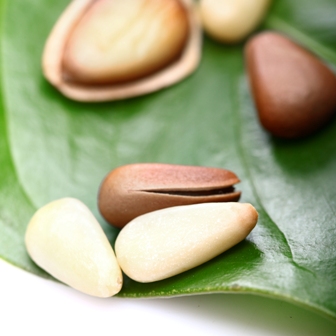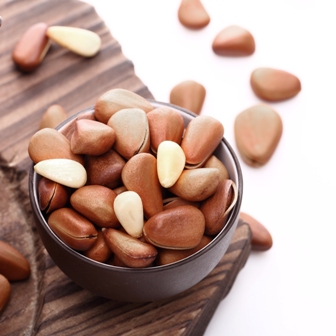Crunchy, yet a buttery texture, pleasantly sweet pine nuts make up the small edible seeds of female cones in a pine tree. Pine kernels are a very good source of plant derived nutrients, essential minerals, vitamins and “heart friendly” mono-unsaturated fatty acids that help reduce cholesterol levels in the blood. Nowadays, pine nuts are becomingly increasingly popular in China as a healthy snack. As a result, the export and import market for pine nuts in China has a bright future.
Typical breeds of Pine Nuts in China
The two main types of pine nuts available in the Chinese market are Brazilian pine nuts and pine nuts from the Northeast region of China. Just why are these two types so welcomed in china? Here are some details of both types:
Pine nuts from the Northeast of China (Chinese sweet Northeast pine nuts)
The Jilin Province, located in Northeast China, is the main Chinese pine nut production area.The Main Chinese pine tree variety is the Korean (red) pine. Harvest time is between September and October next year when pinecones are sun-dried or machine dried. 
When the pinecone is ripe the scale opens and the seed appears inside, and the part of endosperm of the seed is edible as pine nut. The pine nut with its yellowish colour is called China’s “long life seed”. In Chinese medicine: pine nuts are good for weak, old or postpartum people. There is a well-known phrase called, “eat pine nuts, drink water”.
Pine nuts contain many nutrients, most notably potassium, phosphorus, and vitamin E. In addition, they have generous amounts of polyunsaturated fatty acids. They also contain linolenic acid of the series of n-3, also an unsaturated fatty acid. This acid is different from those contained in other vegetable oils. In pine nuts, it is called P-linolenic acid, or Pinolenic acid in Japan Pinolenic acid has many functions, such as lowering bad cholesterol, preventing arteriosclerosis by increasing blood circulation, aids blood vessel elasticity recovery, cleans the blood, and reduces hepatic fat.
Brazilian pine nuts (Pinhão)
Brazilian pine nuts are also called Pinhão, the seed of Araucaria anguvstifolia. Although they are classified as pine nuts this is somewhat misleading, as they are unlike the pine nuts English speakers would associate with the name. Pinhão is a much bigger nut at around 5cm (2 inches). It’s starchier than European pine nuts and actually tastes quite similar to bunya nuts from the Australian Bunya pine. Pinhão has a special place in southern cuisine, and can be simply eaten boiled or roasted, as well as made into more complex dishes. Similar to large pine nuts, they are edible, and are extensively harvested in southern Brazil (Paraná, Santa Catarina and Rio Grande do Sul states), a habit particularly important for the region’s small population of Native Americans. The seeds, called pinhão are popular as a winter snack.
Two famous producers of pine nuts in china
Hunchun HongSongBao Pine Nut Industrial Co., Ltd
The company’s research and develop centre has launched more than 200 kinds of products. They have 3920 m2 of GMP (Good Manufacturing Practice) workshops which meet the EU and FDA standard. The Quality Control Centre consists of a Raw Material Test Section, Physical & Chemical Test Section, Packaging Material Test Section, Process Monitoring Section and GMP standard Microorganism Test Section of final products. The company offers a range of professional services for you to boost your sales; from formulas, design, sourcing, packing, etc. with a warm and thoughtful attitude at the highest mode of convenience and efficiency.
As a result of their international standard advanced manufacturing facilities, large-scale production and high production efficiency, they are able to provide good products at a favorable price.
Jilin Zhongxin Chemical Group (JZC)
Jilin Zhongxin Chemical Group Co Ltd. is located in Jilin city-state, and the Jilin economic technology development zone covers an area of 1 million square meters. They are China’s international chemical enterprise group that develop, produce, sell and transfer technology of fine chemicals.
The company was founded in 2005 and is it high-growth private enterprise, mainly dedicate to the research of after-processing ethylene epoxide and ethylene epoxide ramification. Main products include polyethyleneglycol, triethanolamine and others. Their network is around China, made up of chemical distribution places. The company has passed ISO9001 and 14001 quality system authentification. With the quick development and successful cooperation for foreign enterprises, they have rapidly developed into an international chemical enterprise. At present, the company has established enterprises of Jilin Jinlifang Chemical Co., Ltd., Jilin Kaimaisi Chemical Co., Ltd., Jilin Weilunsi Chemical Co., Ltd. and others. In addition, they are looking to set up two Sino-Italian joint ventures in Italy.
The company is a hi-tech enterprise which owns high technology storage and many independent knowledge rights. We have established a close cooperative relationship with domestic and external colleges, as well as strong power scientific institutes. High purity sodium isethionate and 1020 ester and other products have got an independent property right. Product quality is a leading attribute at an internationally recognized level and fills in the state blank. They possess enterprise management experts who have worked on management works in China Petroleum for many years and have a wealth of experience. The company can offer original force for our quick developments as technological innovation is their expertise. All the employees offer a greater quality of products and service for new and old customers, as well as closely cooperate with domestic and external partners to develop new products and new technologies.
If you’d like to know more about the Chinese market, contact us!
See also:
Follow us on Twitter:
What are the main types of pine nuts available in China, and why? https://t.co/Ww8fGn73gr pic.twitter.com/dwphayATb1
— Daxue Consulting (@DaxueConsulting) December 30, 2015





